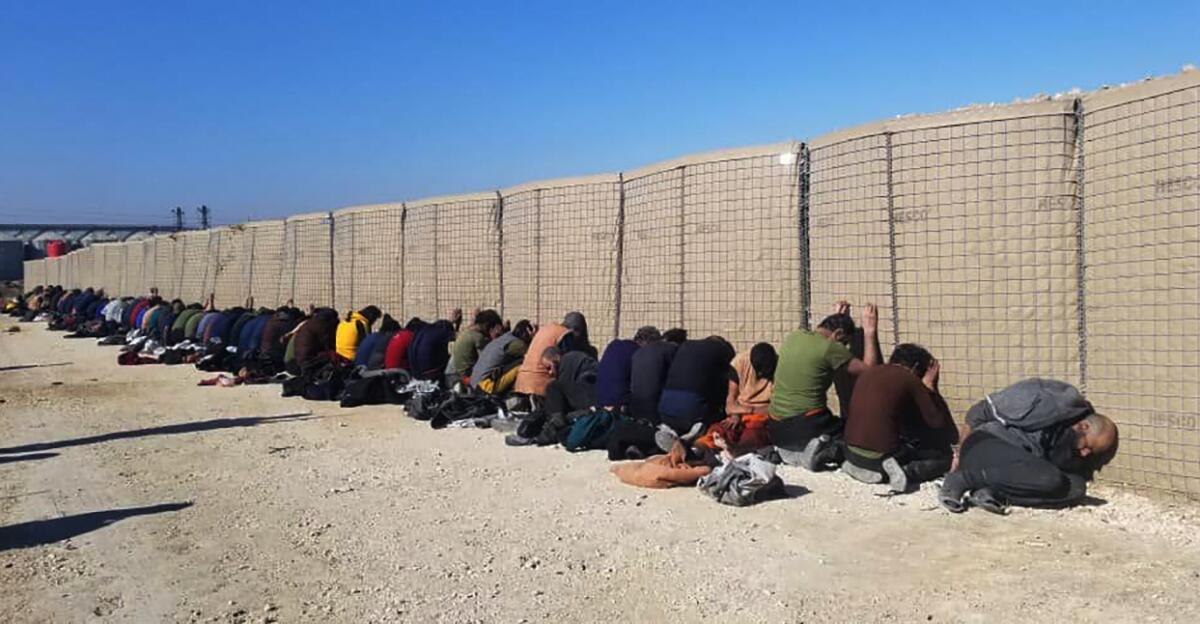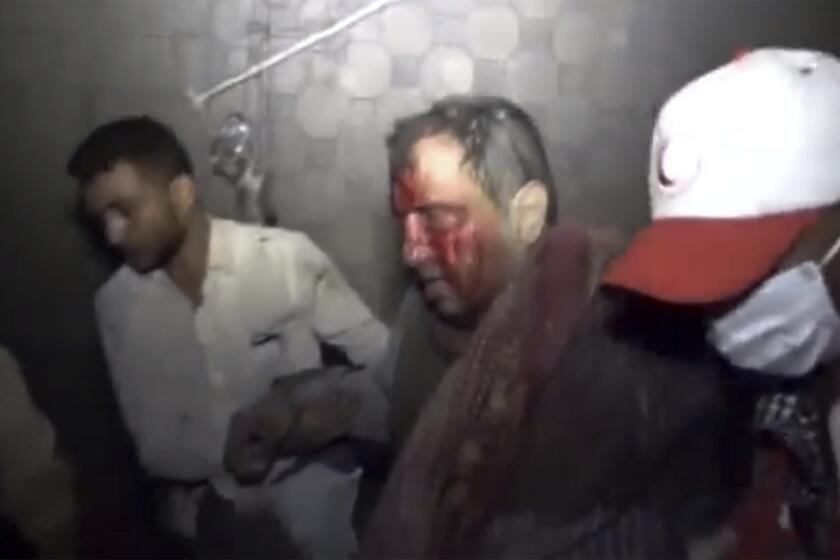U.S.-backed fighters chase Islamic State gunmen near prison in Syria

- Share via
BEIRUT — Kurdish-led fighters advanced slowly Saturday under the cover of U.S.-led coalition air power in Syria’s northeast. Intense clashes with Islamic State group militants took place around a prison where thousands of extremists were held, officials said.
Fighting broke out Thursday night when Islamic State unleashed its biggest attack in Syria since the fall of its “caliphate” three years ago. More than 100 militants assaulted the main prison holding suspected extremists in the northeastern city of Hassakeh, sparking a battle with U.S.-backed Kurdish fighters that has so far left dozens dead.
The Kurdish-led Syrian Democratic Forces lost 17 fighters killed and 23 wounded since the fighting began, spokesman Farhad Shami tweeted Saturday. Dozens of Islamic State gunmen were also killed.
Despite their defeat in Syria nearly three years ago, Islamic State sleeper cells have carried out deadly attacks against Syrian Democratic Forces as well as government forces on the west bank of the Tigris River in eastern Syria.
Yemen’s Houthi rebels and an aid group say the death toll from a Saudi-led coalition airstrike that hit a rebels-run prison climbs to 82 detainees.
The group’s territorial control in Syria and Iraq, where they once declared their “caliphate,” was crushed by a years-long U.S.-backed campaign. But its fighters continued with sleeper cells that have increasingly killed scores of Iraqis and Syrians in past months.
The U.S.-backed Kurdish-led Syrian Democratic Forces brought more reinforcements into Hassakeh in an attempt to regain control of areas taken by Islamic State, residents said. More civilians fled the areas of fighting as sounds of explosions echoed in the city and black smoke billowed from the Gweiran Prison area on the southern edge of Hassakeh.
Hassakeh Gov. Ghassan Khalil told Syrian state media that some 4,000 civilians have fled to areas controlled by Syrian government forces in the city and its suburbs. He told state TV that authorities set up three shelters for the displaced and mosques were also asked to open their doors for those who were forced to leave their homes.
Hassakeh-based journalist Adnan Hassan said in the early afternoon, a large Syrian Democratic Forces group consisting of scores of fighters, Humvees and vehicles carrying heavy machine guns arrived in the areas to boost the anti-Islamic State operations.
Syrian Democratic Forces fighters “succeeded in thwarting the attempt to free the prisoners but it is not clear when they will have the situation under full control,” Hassan said.
Gweiran Prison is the largest of around a dozen facilities run by U.S.-backed Syrian Kurdish forces holding suspected Islamic State fighters. Gweiran holds more than 3,000 inmates, including Islamic State commanders and figures considered among the most dangerous.
“The battles are taking place on the edge of the prison,” Syrian Democratic Forces spokesman Siamand Ali told the Associated Press, adding that most of the prison is under their control apart from a small part that is held by rioting prisoners. He added that fighting is also ongoing in the nearby Zuhour neighborhood, where Islamic State fighters were holed up.
Ali said Syrian Democratic Forces fighters and U.S.-led coalition aircraft targeted a technical academy building where dozens of “Daesh terrorists took positions.” Ali, who used an Arabic acronym to refer to Islamic State, said Syrian Democratic Forces fighters are advancing slowly in order to protect the lives of civilians as Islamic State gunmen are holed up in alleys and in residential homes.
He said the Syrian Democratic Forces’ elite anti-terrorism unit and commandos are leading the operations that intensified Saturday night in neighborhoods east of the prison, where scores of Islamic State fighters are holed up. He said Syrian Democratic Forces officials are at the same time trying to convince rioting detainees to surrender, because a confrontation inside the prison “could have grave consequences” due to the large numbers of detainees.
Ali said some 45 Islamic State gunmen were killed in the fighting and dozens of prisoners who fled were recaptured.
The Britain-based Syrian Observatory for Human Rights, an opposition war monitor, said that since Thursday night, 89 people have been killed, including 56 Islamic State gunmen, 28 Kurdish fighters and five civilians. The Observatory added that Syrian Democratic Forces fighters were using loud speakers to call on Islamic State fighters to surrender but the extremists refused.
On Friday, the Syrian Democratic Forces’ top military commander, Mazloum Abadi, said Islamic State mobilized “most of its sleeper cells” to organize the prison break.
The militants, armed with heavy machine guns and vehicles rigged with explosives, attacked Thursday evening, aiming to free their comrades.
Pentagon press secretary John Kirby said Friday the U.S. used airstrikes to support the Syrian Democratic Forces.
On Friday a Syrian Democratic Forces spokesman said they recaptured 104 militants who escaped from the prison. But he said the total number who had broken out was not determined.
The Islamic State group claimed responsibility for the prison break on its Aamaq news service Friday, describing it as ongoing. Freeing convicts and imprisoned comrades has been a main tactic of the group. During their 2014 surge that overwhelmed territory in Iraq and Syria, Islamic State carried out multiple prison breaks.
At its height, the Islamic State group’s self-styled caliphate covered a third of both of Iraq and Syria. The ensuing war against them lasted several years, killed thousands, and left large parts of the two neighboring countries in ruins. It also left U.S.-allied Kurdish authorities in control of eastern and northeastern Syria, with a small presence of several hundred American forces still deployed.
More to Read
Sign up for Essential California
The most important California stories and recommendations in your inbox every morning.
You may occasionally receive promotional content from the Los Angeles Times.











